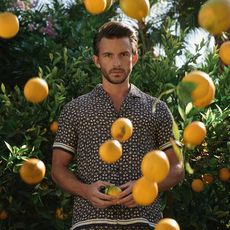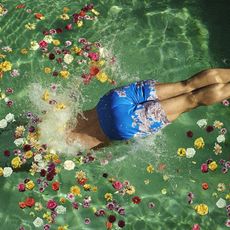WHY MORGAN MAASSEN RULES THE WAVES
We take a deep dive with the image-maker behind our Sustainability Campaign Film.
Morgan Maassen is a man who likes to be underwater. So much so, in fact, that his career has largely been spent beneath the waves. The 30-year-old photographer and film maker is one of the foremost documenters of life in and on the world’s oceans.
Maassen – along with his three constant companions: his dog Moose, his water canteen and his camera – travel the globe charting our ever-evolving relationship with the seas. Maassen’s father is a fisherman, so he has long seen first-hand the effect of humans on our oceans. “You want to protect what you love,” he says on the phone from his Californian home. “It has always been a huge part of my life.”
Maassen’s skill as a filmmaker and his commitment to sustainability meant he was the first person we called when we wanted to produce a film explaining our carbon rebalancing partnership with SeaTrees. This non-profit organization, based in California, is dedicated to preserving ocean ecosystems and using the carbon-sequestering properties of sea plants to reduce the carbon in the atmosphere. “It is a positive and uplifting development,” Maassen says of Orlebar Brown’s commitment to become a carbon negative brand.
With 271,000 followers on Instagram, it’s clear we are not Maassen’s only admirers. We spoke to him about making films in the pandemic, difficult moments with sharks, and the actions we can all take to save the oceans.
Can you talk me through the film?
So, the film is to launch the partnership between Orlebar Brown and SeaTrees. There’s footage from the sites in Indonesia where SeaTrees work – you see mangrove restoration and growth projects – and then, close to where I live in California, you see their kelp restoration project, which help sequester carbon in the ocean.
Was it especially challenging creating a film at this time?
It’s been a big challenge working during the pandemic. Immediately I knew going to Indonesia myself to film was off the table. I had to jump into remote management, corralling footage from a project site on the other side of the world. And as for the footage we shot in California, we’re in the dead of winter here. We had some pretty foul weather for the short window of time we had to capture what was needed. Our window was plagued with rain and a large swell, pushing us to the deadline… but then, all the stars aligned. That morning that we met up at the harbour - it was borderline hilarious - as it was absolute pea soup fog – the most abnormal fog I've ever seen or experienced, something totally unheard of in a California winter. But we managed it.
Does carbon rebalancing offer hope for the future?
Without question! I think this is a very compelling way for anyone and everyone to help the ocean. It helps communities, it helps the ecosystem, it changes the way humans interact and exist. There's a huge quantitative shift that comes in effect with it all, from the micro of mangroves and consumerism to the macro of the health and success of oceans and planet.
Is it more difficult shooting below the water than on it?
I shoot with the Red camera in an aluminium water housing. So, my controls are limited, the camera is large and cumbersome. And then you couple that with having to swim, either against the current or working around boats, or you're in waves or with reefs or wildlife. All of a sudden, the determination and the concentration it takes to get a shot - just one single shot - compounds immensely. It's kind of like this weird dance. But when it does work out it’s magnificent.
What steps can we all take to preserve the oceans?
A small decision that has a huge effect is removing plastic from your life. If you stop using plastic water bottles and really avoid non-reusable waste like that, the effects are incredible, short and long-term. It takes 5,000 years for plastics to breakdown and that goes straight into the ocean and causes immense damage. It’s also important to pinpoint brands that are reducing their footprint in their manufacturing and in how they transport products. If you're able to align with them, the ripple effect through the places they work and operate, and the places they support is enormous. An example would be if you're buying a pair of swim trunks from OB to go on vacation in coastal England or Dubai, you’re able to get a product that has been made from a sustainable supply chain. So whether or not you experience the ocean daily, or where you are holidaying, you can do something to help.
What’s the scariest moment you’ve experienced underwater?
I’ve had several close encounters with sharks in Tahiti, South Africa and Australia. In Tahiti, I was very close to being overwhelmed by waves while I was carrying my camera. I slammed the reef and was buffeted by waves that were above my experience level in size and power. In Iceland, I was free diving underneath a frozen lake, I got a little lost and couldn’t find my way back up. That was terrifying.


